FIA Team Principals press conference – Monaco
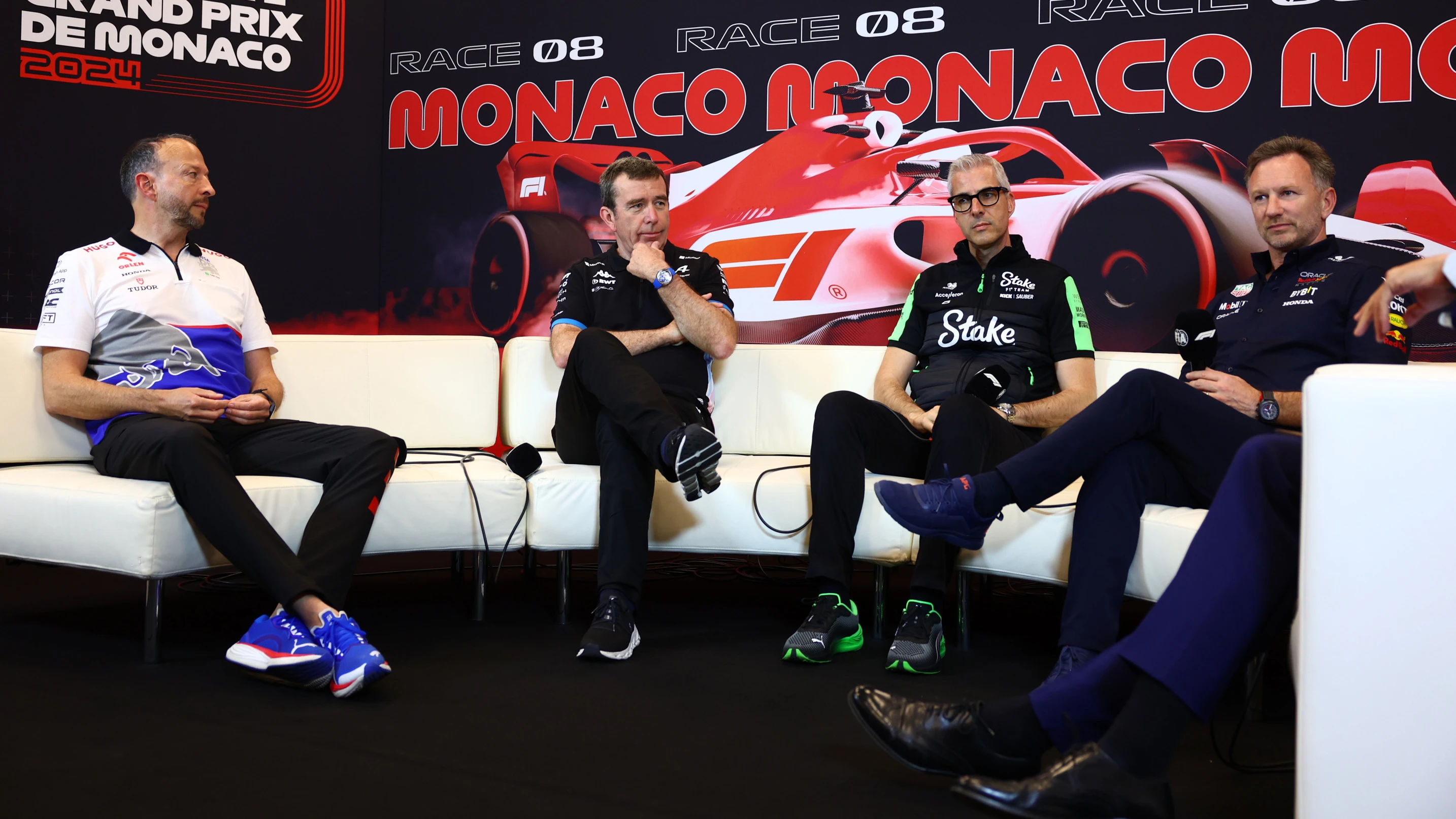
TEAM REPRESENTATIVES: Peter BAYER (RB), Bruno FAMIN (Alpine), Alessandro ALUNNI BRAVI (Kick Sauber), Christian HORNER (Red Bull Racing)
Q: Peter, why don't we start with you, if we could. You're coming up to the first anniversary of your time as CEO of VCARB. Can we just be reflective for a minute? How do you look back on the first year? What is your proudest achievement so far?
Peter BAYER: Well, good afternoon, everyone. Look, it has been an amazing year, as I had the chance for six months to work with Franz Tost, who has built an amazing legacy in Italy, in the UK, in Bicester, and together with Laurent Mekies, who joined us on the 1st of January, we had the honour of taking over the keys to the team. And since then, we've been pushing, making sure that we are a team that stands on its own two feet. I think the main focus really was on changing the culture in the team, changing the mindset. which I believe we're making step by step progress on. It has also allowed us to attract some new people, new talent to the team that perhaps previously would not have considered us as a potential employer. So I think that's great to see. And it's also good to see that we have two drivers who are finding performance, helping us to move forward. And perhaps on a personal note, it's just, as an Austrian, it's a great honour to be part of the Red Bull family. And yeah, it's been an enjoyable year. I can't believe actually that it's a year, but it's a great time.
Q: And the car this year is fast. It's evolving quickly. Can you challenge Aston Martin on a regular basis going forward?
PB: If I knew… Look, we had set ourselves the target of being on the top of the midfield and we kept saying that P11 is our pole position. Now, yes, our last upgrade from Miami, which was supposed to be presented in Imola, has allowed us to find performance. Both of the drivers seem to be confident in the car. But we've also seen that Aston obviously brought a huge upgrade. But clearly, all of us, as I said, the change of mindset really is to look forward, to keep pushing and to challenge them, one after the other. So we'll try our best and fight until the end.
Q: Let's talk drivers. Yuki, first of all, he's scored points in four of the last five races. Do you feel he's improved since last year?
PB: I definitely believe he has made a big step forward. It's physical preparation, but it's also his mental readiness to perform and deliver. One example I mentioned the other day: I think he simply understood that every time he would be swearing on the radio, that would cost him a tenth. So he's got himself under control. He's extremely professional in the work that he's putting into the feedback with the engineers. And yes, he definitely made a big step up.
Q: Are you keen to keep him next year?
PB: Yes.
Q: When are you going to confirm your drivers for next year?
PB: I think we're very happy with both of our drivers. And honestly, we're not wasting time with discussing ifs and whens. We have a very strong line-up. We have a great reserve driver. We have great talent coming through F2, F3. And currently, it's all about focusing on performance. And perhaps the focus is more on Aston Martin in front of us than on driver discussions.
Q: Final one from me. Both drivers lost positions at the start last time out at Imola. I think both lost two places. Is that an area of concern as we head into the race weekend here?
PB: We had throughout the season very mixed emotions on the starts. Very good ones, not so good ones, like in Imola. But perhaps in Imola it was sort of aggravated by the fact that you've got that Turn 1 and it can stack up on the left side or on the right side. And we got a bit unlucky with getting stuck on the left side. But yes, I believe that we can improve like in all areas. We will definitely look at all the different elements from tyres to the clutch, to all that comes with it. But I guess one thing I can say is, you know, it seems to our optimum seems to be in a very narrow window and probably looking into how we can enlarge the window for the operation and the procedure a bit so that it's a bit more forgiving than what it currently is.
Q: Peter, thank you very much. I'm sure there'll be more questions for you later. Bruno, let's come to you now. A tough start to the weekend in FP1. First of all, what were Pierre's issues?
Bruno FAMIN: Yeah, good afternoon, everyone. Maybe if I can anticipate about drivers, my answer is exactly the same as Peter's.
Q: What, you want Yuki and Daniel next year?
BF: Word by word, the same. With our two drivers, I mean. Yeah, it was a waste gate issue on Pierre's car. We solved it during the session. Then he has been able to just do two laps by the end of the session just to make sure it was okay. And let's focus on FP2 now.
Q: What about Esteban's side of the garage? Did you make good progress?
BF: We know that it's going to be difficult here for our car, which is stiff, low, and we are going to suffer if the weather situation remains as it is – dry. Then we're working, but it's a good opportunity to work on the set-up, to improve it, and to work always harder to improve the car.
Q: You say it's going to be difficult for you this weekend, but when you consider where the car was at the start of the season, how satisfied are you with the recovery so far?
BF: Where I'm satisfied is with the reaction of the team, because the car is what everybody knows at the start of the season, but we have been able to bring earlier than planned upgrades to come back to the minimum weight. And that was very good. Now we need to switch to the… And this is what we are doing, to switch to the second phase of the development of that car. You know that we have worked quite a lot in understanding why we were in such situation. And having with us now since two weeks David Sanchez on board will help us to go faster in the recovery, which is what we hope. But for the time being, it's a bit too early to talk about when we will be able to bring the next significant upgrade.
Q: Has David Sanchez been able to make an immediate impact on the performance of the car?
BF: I think there is nothing magic in the performance of the car, but he has an immediate impact in the mindset of the team, in paving the way for everybody, in setting a clear position we need to follow for developing that car and the following one.
Q: Bruno, the final one for me is drivers. Is your number one plan for 2025 to keep the drivers you currently have?
BF: Again, it's not Yuki and Daniel, no misunderstanding. But no, I think we really need to focus on improving the team, developing the team. This is the first priority. And we don't feel any pressure about the driver market because we have two good drivers. We will be happy to continue with them. but we want to take our time and we have very good drivers in our academy, with Jack [Doohan], with Victor [Martins] especially, and we have no stress.
Q: Alright, thank you. I'm sure there'll be some more questions for you. Alessandro, coming to you now. Now, the last couple of races have been tough for the team, especially in qualifying. What have been the issues with the car?
Alessandro ALUNNI BRAVI: Good afternoon to everybody. I think it was lack of performance, simply. You know, we start the weekend in FP1 on the back foot. We were not able to recover in time for the qualifying session. We have seen that the race pace was much better, but of course we need to recover performance, to accelerate the upgrades. We introduced a new floor in Imola that gave us some improvement, but not sufficient to close the gap, especially to Racing Bulls and also to the Haas F1 team. Here we have a new concept, a new generation of rear wings that should help us to find additional performance, but of course the field is very tight. We need to push more on the performance side, so there is no other reason than lack of performance.
Q: Bruno has already said that he thinks his car doesn't suit the Monaco circuit very well. Do you think this is an opportunity, on the other hand?
AAB: I think there is no car that suits one circuit or the other. If you have a good baseline, you can be competitive in every circuit. In our case, I think that here will be very important to put it all together, you know, also drivers are a factor, especially in qualifying. We need to, you know, to work well as a team, maximizing track time and to assess if our new rear wing brings the good performance that we expect and I think that then the weather condition will be also a factor. This afternoon maybe we will have you know a wet session. so I think that here you have a lot of different elements that can play a role, but if we have a good baseline set up and the drivers are comfortable and the car is easy to drive, this helps. For us, the focus is not on different tracks, it's to find more performance of the car. This is the main target.
Q: What about performance in the pit lane? Because your early season races were compromised by pit stop issues. You brought updates at Imola last weekend, how did they perform?
AAB: I think the pit stops in Imola were good, so we didn't lose position in the pit stop compared to the other drives that pit at the same time. So I think that we can put behind us these issues and now we can move forward and be focused on other topics.
Q: One other topic being drivers for next year. You've confirmed Nico Hülkenberg. What are you looking for from driver number two? Does it have to be a driver with experience, given that you've already got experience with Hülkenberg?
AAB: We say that we want to try to have the best pair of drivers available in the market. It's not just depending on our team. It's depending, of course, on the availabilities, depending on many factors. We have seen that the market is quite fluid and each day we see in the press, you know, new names and new combinations. So I think the target is to have the very best drivers available for us for a long-term project like the Audi F1 team project.
Q: Do you have a deadline in mind?
AAB: Not a deadline. We have a target that I think we need to try to find the very best option.
Q: Alright. I'm sure there'll be more questions on this in a minute. Thank you, Alessandro. Christian, thank you for waiting. Now, Max won brilliantly at Imola, but it wasn't a smooth weekend for the team. Have you started Monaco in better shape than you did last weekend?
Christian HORNER: Well, look, I mean, obviously Imola was a difficult, or a more difficult, weekend where we achieved pole position and a Grand Prix victory. But it was a much closer finish and it was a race of very much of two halves for us. The first half of the race was very strong in the second half, or the last 20 laps really, we faded in performance. I think we've taken a lot of lessons out of Imola. Monaco's a completely different challenge. You can see, I think, the Ferraris will be quick, the McLarens will be quick. You know, Mercedes looked quick in that first session as well. So it's going to be a very competitive qualifying tomorrow afternoon.
Q: Do you think you're starting the weekend on an equal footing with the likes of McLaren and Ferrari?
CH: Well, it's inevitable. I mean, we're in year three of these regulations, and it's inevitable that you're going to get convergence. It's amazing that we've managed to stay ahead for so long. But as the cars converge in look and shape and therefore lap time, it's inevitable that there's going to be strong competition. So we fully expect that here in Monaco. It's a unique layout on the calenda and of course, it's all down to that one lap tomorrow afternoon.
Q: Now, McLaren and Ferrari have brought big upgrade packages in recent races. We've yet to see that from Red Bull. Is that on the cards?
CH: Well, I think we're a bit more iterative. So obviously, we've bought some pieces here and there, and they've done what they've said on the tin. But when you start to get to the top of the curve, you get into a law of diminishing returns in terms of the amount of development that is earning its place on the car. And of course, with the cost cap now, you have to be very selective of when you introduce those upgrades.
Q: Quick word on Checo, and then we'll open it to the floor. He had his worst qualifying of the year last weekend. We've seen fluctuations in form from him in the past. Are you concerned that we're entering a downward spiral for him?
SP: No, I don't think so. I think he's driven very well so far this year. Obviously, Imola was a tricky qualifying or a tricky Saturday for him, going back to FP3. But I think when you look at the drives that he's put in across a variance of circuits this year, he's performing well. So in the fullness of time, we'll work out what we're going to do.
QUESTIONS FROM THE FLOOR
Q: (Matt Coch – Speedcafe.com) All four of you, Andretti has continued to work as though it's going to be in the F1 grid at some point. It doesn't yet have that position. Putting everything, I guess, to the side, would you welcome Andretti and Cadillac onto the grid?
CH: Yeah, absolutely. I mean, I think Andretti has great racing heritage. Mario is a legend of the sport. And of course, Cadillac, a huge automotive manufacturer from the US. I think Formula 1 have said in 2028, if they were to come with their own engine, they would obviously, I think, review it. But in addition to that, I think that if Andretti were to want to come, a little like Audi acquired Sauber, I think to protect the current franchise and stability that we have in the sport, then obviously their best route to goal is to acquire one of the existing teams.
AAB: Fully agree with Christian. I think that Audi shows the right path to come to Formula 1. Of course, Cadillac is a big player and it qualifies this project as a potentially good project. But there is a way that is to buy into an existing team. And I think that the process put in place by Formula 1 is a clear one. Very robust project. So I think that they know which could be the way.
BF: Yeah, I think we're all on the same line. Big name, Andretti, Cadillac, but we have to be very careful not to dilute and to preserve the value of the championship and for the teams as well. And there are two ways, they buy a team or they bring enough value to the championship to compensate. But I think it's the same story from the very beginning, I think.
PB: Nothing to add.
Q: )Luke Smith – The Athletic) Another Andretti-related question for you guys. Six US senators have asked the Department of Justice in the US to look into F1's rejection of Andretti. Could I get your reaction to that? And are you concerned that an outside entity is now looking at a Formula 1 matter?
PB: No, not really, because I think, as we've mentioned before, there are very clear procedures. The FIA has done a technical analysis. Formula 1 has then analysed the commercial potential, and that's sort of, I think, the environment we are currently dealing with. And I certainly believe that, you know, the sport has done a lot to reach out to the United States. You know, we have three races in the U.S. We have two American sponsors. So I think the sport as a whole is embracing the United States, but has nothing to do with what we've just heard.
CH: Look, I mean, we're US-owned. We have five Fortune 500 companies on our car. I think that this isn't about anything to do with Andretti being American or anything like that. I think it's purely down to the business model that is Formula 1. I mean, I remember not so long ago that there would always be two teams at the tail end of the grid needing to be bailed out or being technically insolvent. We finally got into a position where there's great strength and health in Formula 1 and Liberty have to be congratulated for that because they've created a model where even the worst team in Formula 1 probably has a billion-dollar valuation and you know liberty have created that model. I think the approach that they bought by opening the sport as well and bringing a new fandom and new fans into the sports, they have to be commended on and I was surprised to see that Andretti have gone down this process but hopefully if they really want to find a way onto the grid they will find it and but I think the most natural solution is for them to acquire an existing franchise should one want to sell.
Q: (Ian Parkes – New York Times) Peter, you mentioned that you're happy with both your drivers, but just to remind you that last year, following Liam Lawson's performances for the team, Helmut Marko turned around and said that he was pretty much going to be a shoe-in for 2025. So where does Liam figure in your plans? Similarly to Christian, you might want to answer that as well as his reserve driver. But also, are either of Peter's drivers still on your shortlist for that number two seat?
PB: Yeah, look, Liam is an extremely valuable member to the team. He's with us every weekend, obviously. He's doing a lot of work in the simulator. But as I said before, currently we have two drivers in the cars. We are finding performance with the two. And we really do not discuss the 2025 situation, perhaps because we're in a luxury situation of having that strong grassroot pyramid behind us. And so the focus is really on track and on the next couple of races until definitely the summer break.
CH: Yeah, look, I mean, they're all Red Bull Racing drivers, and we're only at race eight, so still plenty of time. It's good to see the youngsters performing well, and it's good to have that competition as well. So Liam is undoubtedly keen to get back into a race situation. The drivers in Formula 2 are performing well at the moment, Formula 3 likewise. So we have a strong vein of talent.
Q: (John Noble – Motorsport.com) Christian, this is the second Friday that Max has had a car that's been on a knife edge and difficult to get into the window. Obviously, the pace was exposed in the second stint in Imola. Are there weaknesses in this car that are now being exposed because the others have caught up and you're having to push it to the edge? Is it fair to say that there's kind of a pressure to improve that you haven't felt maybe for the past 18 months?
CH: I think there's always a pressure to improve and nobody puts more pressure on ourselves than within the team and I think that we're seeing convergence and we're seeing different types of venue, different compounds of tyre as well and I think form will fluctuate from circuit to circuit. So I think that obviously the Friday in Imola, the car was tricky to drive and I think the team did a great job in turning that round and Max was outstanding to get the pole and the victory. So today is a little distorted by some teams running three sets of tyres, including the soft tyre, but let's have a look this afternoon and in FP3, because obviously this race is all about qualifying.
Q: (Giles Richards – The Guardian) Christian, this race last year, just afterwards, you said you'd like to see the track changed to some extent in order to provide some overtaking options. Now the cars remain just as heavy as they were then, they're just as wide as they were then. The chances of overtaking remain as slim because no changes have been made. Would you still like to see some changes made? And what is your assessment of whether the track could be improved in that way?
CH: I think with the size of these cars and the weight of these cars, they're so big now, arguably they're too big to be racing around these streets because you can barely get two side-by-side. So that inevitably is going to cause issues. Now we race here because of the history, the heritage, and it's a phenomenal venue and there's a great deal of prestige in winning this race. But by and large, this race will be won tomorrow afternoon in qualifying. We should always be open to where can we improve. Now, we either need to make the cars considerably smaller going forward for ‘26, which isn't really on the cards, or to have a really entertaining in a race here then we ought to look at least the possibility of could we open up some areas that could potentially create at least an overtaking opportunity and what would it what would it envelop to achieve that? So I think that's something that Formula 1, I know, is acutely aware of, and I'm sure Monaco as well. But to protect the next 70 years here, I think that there needs to obviously be some evolution.
Q: (Josh Suttill – The Race) Bruno, in terms of your car traits, I know you've improved since Bahrain with a number of upgrades, but compared to last year, what are the strengths and weaknesses in terms of low-speed performance, high-speed performance, and so on?
BF: From last year, I'm sure that we are not exactly on the same position. We have developed that car in a way that I think it's a kind of dead hand, to be honest, just to be frank. And we had some upgrades planned. We put it on the car. They worked as expected, which is good. We had it earlier than expected. It was good as well. Now we have to really rethink a bit the situation and to prepare the future upgrades quite differently. But it's part of the process we're having in Enstone where we need to review our way of working to make the company more agile, more efficient, and really performance-oriented, changing the mindset. And again, I think having now, since two weeks, David Sanchez on board will help us going much faster because he's setting a very clear direction for developing the team, and then the car.
Q: (Carlo Platella – FormulaPassion.it) Christian, you mentioned that the lack of show here on Sunday is due also to cars, not just the track. Do you expect the situation to improve with the 2026 regulations?
CH: Here in Monaco? Well, the cars are very similar dimensions, so I don't think they're going to be making overtaking a great deal easier. So I think it's inevitable that as the cars become more and more perfect and the braking distances get shorter and they become more and more efficient, that you need to have areas that you can potentially have some jeopardy, potentially can overtake, and really, here, in these cars now, you've got to be very lucky to pull off an overtake.
Q: (Jon Noble – Motorsport.com) Christian, and whoever else wants to answer, for ‘26, it looks like the cost cap concept is going to change. It's going to go up to 215 or 220 million dollars, but more stuff will be included. Do you think that approach is much better to have a bigger budget but more elements kind of within the perimeter? And from what you've seen so far, are you happy with what's been included and what's been kept out?
CH: I think it's a matter of striking a balance. I mean, I think there's been a huge amount of learning through the cost cap. And I think that what I think is the most important thing for 2026 is that the employees don't bear the brunt of those changes. So I think there's a sensible discussion about what's being included, what is to remain excluded and what actually is relevant to creating performance. For example, does a Christmas party actually make your car go faster? Now, if that is to be included in the cap, of course, every technical director is going to want a front wing as opposed to a Christmas party, which is a bit tight. And so it's finding that balance. I'm not saying that our technical director doesn't like Christmas parties, but he likes front wings. So it's finding that kind of balance where the employees aren't the ones that bear the brunt of this. But I think, by and large, it's been a very productive and sensible discussion. It's finding that balance between what are exclusions and what is included within that higher number.
BF: Maybe the other idea is also to try to simplify the process. It's a very complicated process, the financial regulation, and if we can manage it a bit differently on certain points, it will be a bit easier, a bit simpler to manage as well.
AAB: I think that during the past three, four years of implementation, we have learned quite a lot, you know. Also, how this is applied in different areas. And I think that the target will be to avoid areas that can have different interpretation from the teams, especially, you know, the definition of F1 or non-F1 activities that are a sensible one. The target is to have a level playing field, you know, especially in the car build departments. So all these learnings that we had during these years, I think that can be summarised in the new regulation. It’s an opportunity for all of us to have a clear framework. And I think for teams like ourselves it will be important to introduce an element that can, I would say, equalise differences in terms of cost of life, because of course there is a kind of discrepancy between the cost in Switzerland and in other countries, and I think that we should put all the teams at the same level, at least as a starting point, and so the difference will be the ability of the people and the quality of the work not other factors that can negatively affect this starting point.
Next Up
Related Articles
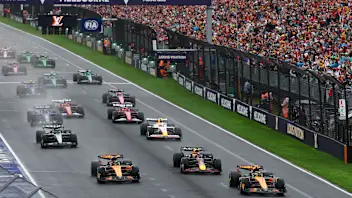 What time is the 2026 Australian GP and how can I watch it?
What time is the 2026 Australian GP and how can I watch it?.webp) ExclusiveDrive to Survive’s producers on how Season 8 came together
ExclusiveDrive to Survive’s producers on how Season 8 came together Watch the ultimate guide to the 2026 cars
Watch the ultimate guide to the 2026 cars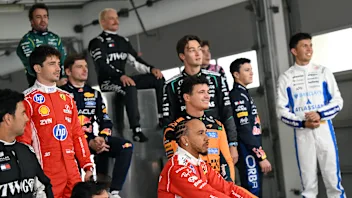 Our writers share their predictions for the 2026 season
Our writers share their predictions for the 2026 season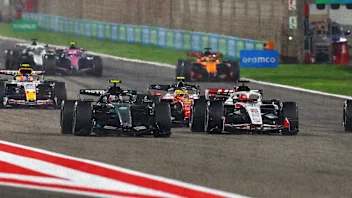 5 key questions ahead of the start of the 2026 season
5 key questions ahead of the start of the 2026 season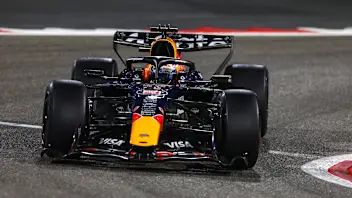 BettingCommon F1 betting and gambling myths debunked
BettingCommon F1 betting and gambling myths debunked